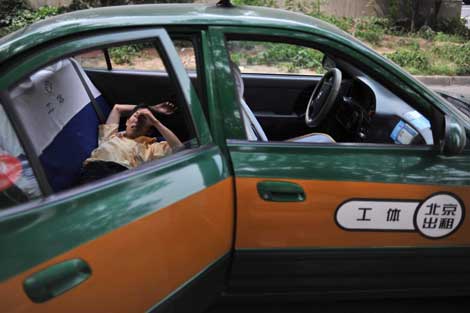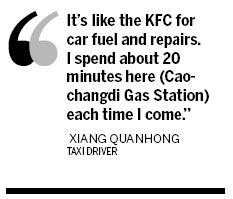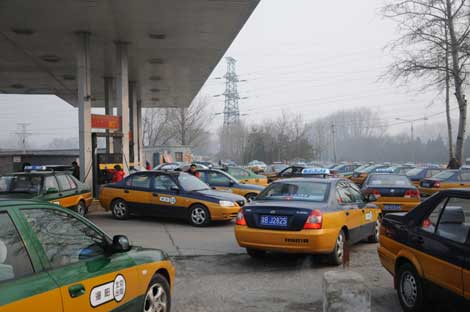Society
Life in the slow lane
Updated: 2011-06-23 07:50
By Xu Lin (China Daily)
 A Beijing taxi driver takes a rest in his car by the roadside. Zhang Mo / for China Daily |
|
Caochangdi Gas Station is a favorite meeting place for cab drivers, with a string of car-wash and car-repair shops nearby. Xu Lin / China Daily |

Being a taxi driver in Beijing means slogging long hours on the road for a meager income. Xu Lin reports.
On a sweltering afternoon in June, dozens of blue, red and green cabs from various companies park at the Caochangdi Gas Station, close to Beijing's Fifth Ring Road. More taxis line up on both sides of a nearby road, that houses a string of car-wash and car-repair shops.
The State-owned gas station has become a favorite meeting place for cab drivers since it opened in 2000.
"It's like the KFC for car fuel and repairs. I spend about 20 minutes here each time I come. The price for 93 octane gasoline here is 7.60 yuan ($1.17) a liter while downtown it is 7.85 yuan ($1.21)," Xiang Quanhong, 44, says. He has been a cabby for eight years, and works 10 hours every day.
He says like him, many of the other regular customers are from Beijing's Miyun county in the north and Pinggu district in the northeast, as these areas are well connected to the gas station by bus.
Two drivers usually share a taxi and its expenses. There are two kinds of cab drivers, daban (big shift) drivers who drive 24 hours and rest 24 hours and xiaoban (small shift) drivers who drive 12 hours every day.
Most drivers park their cabs at Caochangdi at a fixed time to hand over the shift to the next person.
"I fill up gas and park the cab here at 6 pm every day for the next shift to start. And it's not far from my home in Miyun," says Wang Dongli, 38.
"About 90 percent of the customers are taxi drivers, who usually fill up with 20 to 40 liters of gasoline. They can also wash and repair their cars in the nearby shops after refilling. I fuel up several hundred cars every day," Cui Jingjing in her 20s, one of the five station hands, says.
According to Zheng Haiying, manager of the station, about 1,000 cars pass through every day, most of which are cabs.
She says although Caochangdi is not the cheapest gas station, its convenient location makes it a hit with cab drivers. Two other popular gas stations in Beijing are in Madian and Siyuanqiao.
"Daban drivers earn about 2,000 yuan ($308) a month more than xiaoban drivers, but it is hard on one's health to drive for 24 hours. Several years ago, a man in his 30s came to fill up gasoline and suddenly collapsed. He had been doing daban duty for six months," Zheng says.
She says many xiaoban drivers from suburban areas rent homes in nearby Dongxindian village, which has 574 permanent households and a floating population of about 12,000. They live there to avoid wasting two hours on a bus to go to their suburban homes. Each day about 5,000 to 6,000 cabs go in and out of the village.
"Their parents usually stay at home to look after their kids, and their wives have other jobs or do farm work. Cab companies hire them as they don't have to pay insurance for these drivers," Zheng says.
Among them is 39-year-old Wang Jincheng, who gets up at 5 am and goes to bed at 8 pm or 9 pm, with no fixed time for meals.
Wang lives in a 10-square-meter room equipped with just a bed and a closet and pays a monthly rent of 300 yuan, that doesn't include charges for water and electricity. For 5 yuan, he gets a shower in the village bath center.
"It takes only 15 minutes to go downtown, where there are more passengers," he says.
Wang used to be a manual laborer in a factory in Beijing and did odd jobs to help maintain the family. Five years ago, he followed his fellow villagers, aged between 20 and 50, to Dongxindian to make more money.
His wife tills the land at home and looks after their 13-year-old daughter and Wang's mother. Wang goes home once a week, taking a two-hour bus ride to Miyun county and then another one-hour ride home.
Wang says he used to earn at least 3,000 yuan but now makes only 2,000 to 3,000 yuan a month because of the recent oil price hike.
"It's difficult to scratch a living out of the soil nowadays. I can hardly save any money as I have to support my family. I might as well return home and work on a construction site, with a daily income of 100 yuan," he says.
He says he has to concentrate and take care while driving. He works for the Beijing Yuyang United Cab Ltd, whose rules are such that those who break traffic regulations are taken off work and made to study for a week.
"Sometimes I feel sleepy. It's difficult to have a perfect driving record for a whole year. I was sent to study once for driving in the emergency vehicle lane," he says.
Even taking a week's break from driving means he will lose money, as he has to pay the fenziqian, the monthly operations and franchise fee charged by the cab company.
"My partner and I share the yearly commercial insurance of 2,860 yuan. We each pay the company about 3,000 yuan a month. We will soon change to a new car and will have to pay several hundred yuan more," he says.
He says that he must drive about 200 km a day to make ends meet.
On April 9, the bunker adjustment factor (BAF) of Beijing's taxi increased from 1 to 2 yuan. "It makes no difference. Each day I may have 20 customers who only pay a flag-down fare, so there's no need to pay the BAF," Wang says.
"The gasoline price is soaring, it was only about 4 yuan in 2006. However, the cab fare has remained the same. Hopefully, there will be some regulations to improve our income," he says.
E-paper

Pret-a-design
China is taking bigger strides to become a force in fashion.
Preview of the coming issue
Franchise heating up
Party place
Specials

Premier Wen's European Visit
Premier Wen visits Hungary, Britain and Germany June 24-28.

My China story
Foreign readers are invited to share your China stories.

Mom’s the word
Italian expat struggles with learning English and experiences the joys of motherhood again.

